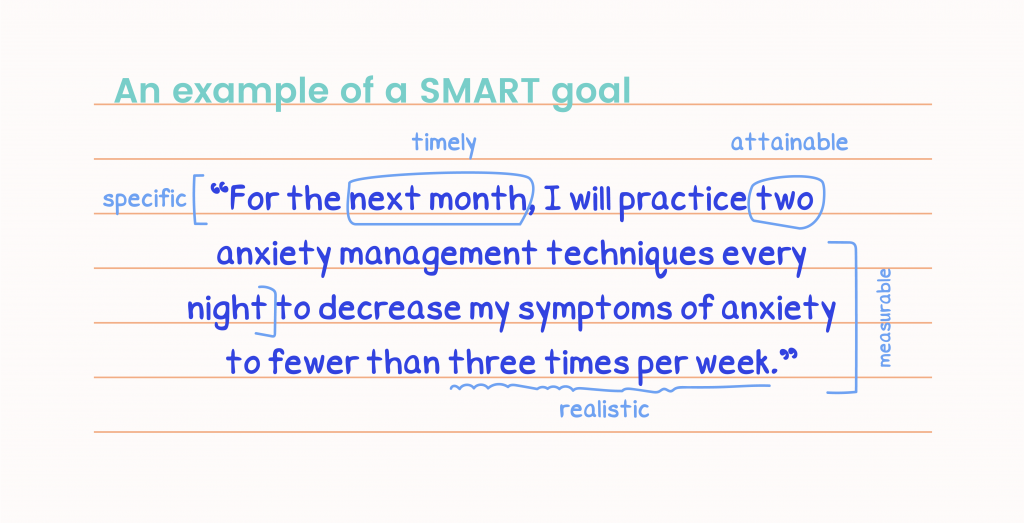Here are some great tips on setting realistic goals and following through with them over the year.
Do you also find it hard to stick to your new year’s resolutions? You’re not alone. Often we don’t realize that our incapability of sticking to our resolutions isn’t the problem; it’s the unrealistic resolutions we set for ourselves. It’s almost like we set ourselves to fail, year after year.
So instead of making resolutions, consider creating smart goals that involve setting intentions, planning, and taking real action.
Specific goals have the power to ensure we can make positive changes for ourselves. While many people may automatically think about their finances and career, it also is good to make mental health goals that can have the potential to make a significant impact on all areas of our lives.
Article Contents:
- Why should I get goals?
- What are some types of goals?
- How to set goals?
- Remember that change takes time
- Feel free to start fresh
- Tips for success
- If you still don’t know where to start
Why should I set goals?
When there’s still a lot of uncertainty as we adjust to the new normal post-pandemic and global lockdowns, setting goals for yourself is an excellent way to stabilize your personal growth and center your happiness.
They give you a sense of purpose and something to strive for, especially mental health goals. By striving to improve your mental health and wellbeing, you can come closer to self-fulfillment. This allows you to flourish in your relationships, school, career, and even in your hobbies.
People that set goals tend to have high self-motivation, self-esteem, confidence, and independence.
What are some types of goals?
There are as many types of goals as there are human activities. They can be short-term, long-term, or medium-term.
- Physical health: weight loss, training, building strength & endurance, learning a new sport, or quitting smoking.
- Career: improving performance, getting a promotion, changing careers, or opening a business.
- Education: completing a degree, learning a new language, or getting better grades.
- Relationships & family: spending more time with family, reducing conflict, or making new friends.
- Creative: learning a musical instrument, cooking, starting a blog, learning to draw or paint, writing a book.
- Financial: saving money, reducing debt, or investing
- Mental health: practicing self-love and compassion, setting boundaries, making time for mindfulness, seeking therapy, or managing anxiety and stress levels.
How to set goals?
Identify your “why”
Before following through with your goals, you need to think about the reason behind them or your “why.”
Avoid setting goals based on what others or society tell you to be like. Make sure they are personal and are rooted and aligned with your values. Your goals should be what you truly want for yourself.
Set SMART goals
Setting SMART goals is a method used to help people define and implement their intentions when changing behaviors or learning new ones. They require thinking of all the factors involved to help determine the pathway to achieving them. The more well-defined your path is, the easier it is to follow.
A SMART goal is specific, measurable, attainable, relevant, and time-bound. Following this criteria helps in incorporating guidance motivation and achieving better lasting change.
So, take some time to define your intentions and your objectives. What do you want to change? And how?
S: Specific
Answer the 5 WH questions: who, what, when, where, and why. For example, instead of a vague goal that’s hard to achieve like “be happier,” set a more specific goal tied to a hobby or activity like “I will spend more time drawing because it makes me happy.”
M: Measurable
The best goals can be evaluated and adjusted as needed. Make the above example more measurable by setting the number of hours you dedicate to drawing a week. As time passes, if you feel like you need to do more or less, you can adjust without guilt or shame.
A: Attainable
One of the reasons most resolutions fail is that people dive in with full enthusiasm to make as much change as possible in their lives without considering if they’re realistically attainable. So, make sure your plans are attainable and realistic.
R: Relevant
Your goals should align with your values and long-term objectives. Any action you set in your goal should directly influence your progress. For instance, your goal might be to increase your typing speed. So, to make the action relevant, your goal will be to set aside 15 minutes every day to practice your typing and take typing speed tests.
T: Time-bound
Give yourself a reasonable time frame to achieve your goals. Deadlines and timelines will keep you motivated and help you prioritize some over others. Think about breaking your big long-term goals into smaller short-term milestones. Your timeline should be realistic and allow you to make adjustments as you go.

Remember that change takes time
Accomplishing change, getting rid of habits, or learning new ones will definitely take time!
It’s also important to expect some slip-ups and setbacks. If things aren’t working, you may have to pause your efforts, readjust your goals, or even scrap them altogether, which is entirely okay!
Hold yourself accountable to achieve your goals and acknowledge that this is a journey.
Feel free to start fresh
Remember that a resolution and a goal don’t need to be tied to the new year. It can be set (and reset) on a weekend or a birthday.
Be kind to yourself, and don’t be discouraged if you slip up. As long as you’re ready to give it another go, you can start over tomorrow, or next week, or even next month.
Tips for success:
- Break your goals into smaller achievable milestones.
- Tell others about them so you can hold yourself accountable.
- Give them priority ranks.
- Visualize them to make them feel real.
- Write them down on paper.
- Constantly evaluate your goals and leave those that no longer serve your values and vision.
- Reward yourself for all your accomplishments, no matter how big or small.
If you still don’t know where to start
If you’re still not sure where to start, don’t hesitate to seek help from a therapist. Talking to a therapist can really help you identify your values, figure out what changes you want to implement, and identify what habits you want to get rid of and which ones you want to adopt into your life.
Download Ayadi today, and let us match you with a therapist that fits your needs. With a network of over 50 qualified bilingual therapists who understand our culture and traditions, you can access high-quality mental health care that is affordable and 100% confidential.

